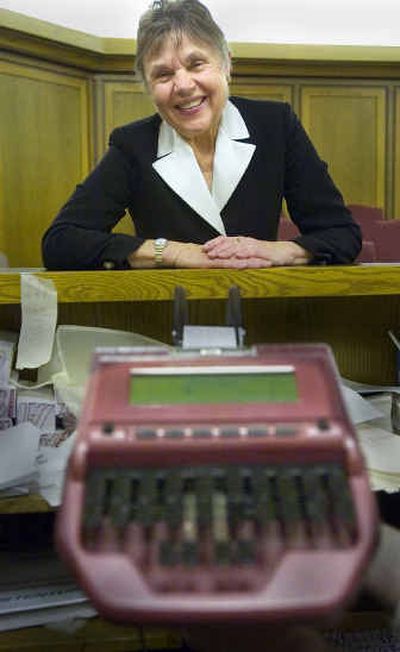Court reporter celebrates 50 years of service

Ann Prideaux, the “dean” of Spokane County’s Superior Court reporters, this week quietly observed her 50th year of taking down everything that’s said in court as fast as people can say it.
Prideaux, 70, retired in 2003 just long enough to start collecting her pension. Otherwise, she has no use for retirement.
Her husband, John, a former state Department of Corrections district supervisor, trains English springer spaniels in retirement, but she prefers working with people.
“I’m still having a good time,” Prideaux said between court cases. “I like observing the attorneys and their tactics. I like the intellectual stimulation. There is so much complexity here.”
As the county’s senior judicial worker by a country mile, Prideaux has seen more legal tactics than most attorneys in the county. Sometimes lawyers seek her advice on their courtroom performance.
In fact, Prideaux’s boss, Judge Robert Austin, considers her a mentor. He’s the county’s second most senior judge with 23 years on the bench, but Prideaux has been with the county 44 years, after starting her career in Walla Walla. She was working for Judge Willard Roe when Austin was in Gonzaga Law School and working as a court clerk. Austin said he learned from Prideaux as well as Roe when he was assigned to Roe’s court.
When he got the chance in 1989, Austin hired Prideaux. By then, she had worked for four other judges, starting with Judge Glenn Bean in Walla Walla when she was 20. In Spokane, she worked for Judges William H. Williams and John Ripple, as well as Roe and Austin.
“I was thrilled to have Ann as my court reporter,” Austin said.
So Austin wasted no time in hiring Prideaux back, as allowed by a controversial state pension law, when she took a token retirement. Her one-month departure entitled her to $30,000 in annual retirement benefits, in addition to her salary, which was $51,000 at the time.
“Aside from her skills as a reporter, she is a wonderful person and a joy to have around,” Austin said.
Like Austin, Prideaux has been elected to public office. She was one of 25 freeholders elected in 1994 to study proposed changes in local government. The group ultimately recommended consolidating Spokane city and county government, an idea that was soundly rejected by voters.
Prideaux grew up in South Dakota and moved to Pendleton, Ore., with her family as a teenager. After completing high school, she cast about for a career and hit upon court reporting. She went to Knapp’s Business College in Tacoma for training on the 24-key stenographic machine court reporters have been using since it was invented in the late 1800s. After a year, she could record 180 words a minute. She stayed for more training because her speed wasn’t great enough, “even in the time when people spoke in a more measured cadence.”
You hadn’t noticed that people speak faster these days, in staccato bursts that match harried lifestyles?
“If you were a court reporter, you would,” Prideaux said.
Court reporters typically record testimony at 220 words per minute, sometimes faster when there’s a burst of speech, Prideaux said. That’s three times the speed of a proficient typist, but court reporter use a keyboard arranged for efficiency and an extensive system of abbreviations they call “the theory.”
The machine and its use have changed remarkably little since it was invented except that the devices are now computerized. A computer chip can quickly decipher notes, displaying or printing them in plain if imperfect English.
“None of us writes exactly perfectly, and all of us develop our own quirks or way of writing,” Prideaux said. So computers routinely cough up what are called “untranslates.”
A human touch is needed to finish the job. Prideaux employs an assistant, or “scopist,” to clean up the computer’s rough draft when attorneys want a transcript. Then Prideaux applies the final touches.
The human touch is why court reporters are still in demand. Their method of preparing transcripts is much faster than transcribing the audio recordings used in many smaller counties, and voice-recognition computer software is much too primitive. Also, court reporters aren’t subject to undetected mechanical failure.
But the big advantage of court reporters is the judgment they apply in the courtroom. When lawyers and witnesses talk at the same time or speak too softly, it is the court reporter’s job to set it right. It is common for Spokane County court reporters, with the blessing of their judges, to intervene in problems a tape recorder would ignore.
So much exposure to the law and lawyers hasn’t made Prideaux jaded. In fact, at one point she thought about becoming a lawyer.
“I hadn’t known when I was young that I was bright enough to do it,” Prideaux said. She later overcame that doubt, “but I hadn’t had any college and I was a mom.”
Her regrets, though, are reserved for the young people she all too often sees destroying their lives with drugs and alcohol. That’s the down side of her job, Prideaux said, but she still loves watching people in court.
“They’re the most fascinating creatures in the world,” she said.